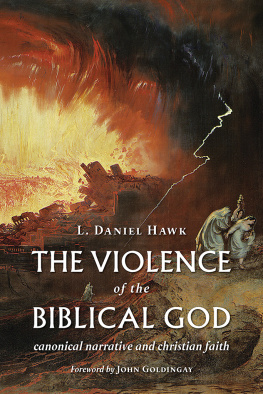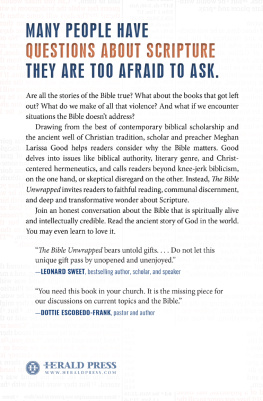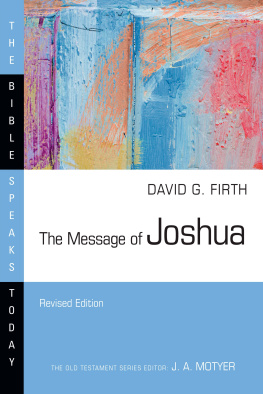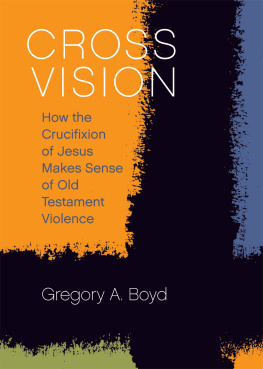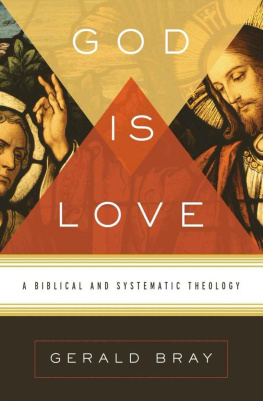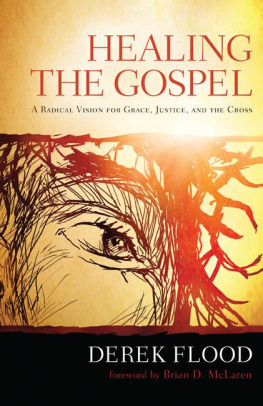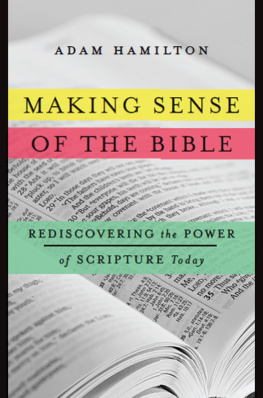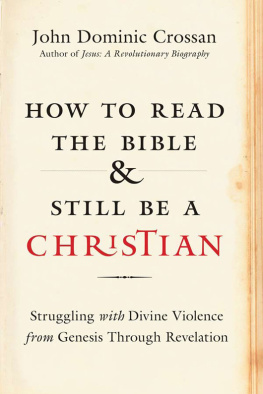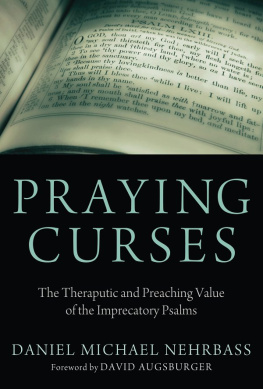The Violence of the Biblical God
Canonical Narrative and Christian Faith
L. Daniel Hawk
WILLIAM B. EERDMANS PUBLISHING COMPANY
GRAND RAPIDS, MICHIGAN
Wm. B. Eerdmans Publishing Co.
4035 Park East Court SE, Grand Rapids, Michigan 49546
www.eerdmans.com
2019 L. Daniel Hawk
All rights reserved
Published 2019
2827262524232221201912345678910
ISBN978-0-8028-7244-9
eISBN978-1-4674-5260-1
Library of Congress Cataloging-in-Publication Data
Names: Hawk, L. Daniel (Lewis Daniel), 1955- author.
Title: The violence of the biblical God : canonical narrative and Christian faith / L. Daniel Hawk.
Description: Grand Rapids : Eerdmans Publishing Co., 2019. | Includes bibliographical references and index.
Identifiers: LCCN 2018026326 | ISBN 9780802872449 (pbk. : alk. paper)
Subjects: LCSH: Violence in the Bible. | Bible. Old TestamentCriticism, interpretation, etc. | God (Christianity)
Classification: LCC BS1199.V56 H39 2019 | DDC 220.8/3036dc23
LC record available at https://lccn.loc.gov/2018026326
Abbreviations in this volume follow The SBL Handbook of Style, 2nd edition.
For my sons, Danny and Andrew,
who are not impressed by easy answers
Contents
I am bored by the topic of the violence of the biblical Godjust not when Dan Hawk writes about it.
I am bored by it because people who ask or write about it are inclined to give the impression that we all know that Jesus is obviously against violence, so the question is how can we explain (away) the manner in which much of the Bible speaks about war and violence. In this connection as in others, its easy to make allowance for the Bibles being culturally rooted. Its harder to work with the extent to which our Christian views are culturally rooted. After all, were Christians and we accept the Bibles authority, so our instincts must be basically right, mustnt they? We dont realize the extent to which our framework for thinking about the Bible and violence (among other topics) is culturally determined.
But I am not bored when Dan Hawk writes about this subject. There are biblical scholars who through their lives flit from one subject or one book to another; when they are done with Psalms they move on to Isaiah and then on to Genesis and then on to the next thing. I am one of those scholars. There are other biblical scholars who worry at a particular topic or book for most of their academic lives. They keep coming back to it, they keep looking at it from new angles, they keep chewing over it, they keep wrestling with it. Dan Hawk is that kind of scholar. He has been badgering the topic of war and violence for forty years.
Every Promise Fulfilled, his first book on the subject, showed what insight can emerge if we lay aside for a moment our assumptions about a subject (in this case, the book of Joshua is all about violence) and just pay attention to the text and read it carefully. It turns out that Joshua is all about Gods promises and Israels promises and about how far either side fulfills them and what the implications are.
Dan Hawk knows that the central truth about God is that he is good-natured and patient and always on the run with his arms open like the prodigal father, and he knows that the central truth about human relationships lies in harmony and forbearance and mercy. But he also knows that there is a lot in the Scriptures that reflects other noncentral truths about God, such as Gods willingness to say Okay, thats it and humanitys obligation to echo that declaration. And in this book he shows that he knows there is a narrative shape to Gods working at Gods purposes in the world and that this narrative shape helps us understand and work with some of the tensions in the perspectives the Scriptures hold before us.
My students have often come to seminary hoping to find answers to questions that have troubled them. Sometimes over the years they have been given straightforward answers to such questions, but they have come to see that these straightforward answers dont work. Often they have questions I have wondered about, too, and sometimes I think I have an answer and can give it to them. In working as a seminary professor, one experience I love is the occasional moment when I give students such an answer and a light comes into their eyes as they see that the answer works. On other occasions they dont like my answer or they are not convinced by it. And on yet other occasions I invite them to see that Christian faith is often about living with questions rather than having answers. The problem of evil and suffering is an example, as is the relationship between Gods sovereignty and human responsibility. Dan Hawk starts this book with a comparable observation about violence, that it may be more important to think biblically than to seek biblical answers.
My stepdaughter and her husband, Katie-Jay and Gabriel Stauring, have given the past ten years of their lives to taking political and practical action on behalf of victims of violence, in particular as it has decimated and traumatized the Darfuri people of Sudan who are now in refugee camps in Chad. A couple of years ago I was asked to talk about the Bible and violence in a Bible-believing church. What people wanted, and what I tried to give them, was some understanding of how to think about the way the Bible talks about violence. But my wife and I also showed them videos of the lives of the Darfuri and of the work that Katie-Jay and Gabriel have been doing, and we challenged the congregation regarding whether their concern about violence was just something in their heads or whether they expressed that concern in their lives. I believe this is consistent with Dans message in this book. He encourages us not only to be ready with a biblical answer when confronted with violence, but to respond redemptively in a way informed by the Scriptures.
There is an approach to Ecclesiastes that uses the book as a way of getting people to see how empty life is, so that one can then tell them about Jesus who is the answer to this emptiness. I dont believe that this use of Ecclesiastes corresponds with how it got into the Scriptures, but I dont imagine that God minds much if the approach leads people to trust in Jesus. In an analogous way, Im not wholly sure why God inspired the biblical authors to talk so much about the violence of God and the violence God commissions, but I suspect that God will be glad if wrestling with the question and facing the reality of violence drives us to stop just discussing violence and to do something about it.
JOHN GOLDINGAY
Fuller Theological Seminary
I have been thinking about the violence of the biblical God for a long time. While attending Asbury Theological Seminary, I had the privilege of participating in a small group led by Dr. Robert Lyon, late Professor of New Testament Interpretation, which convened in his home. Bob called the group The LO SocietyLO standing for Loyal Opposition. Bob envisioned a prophetic evangelicalism that pursued a path of peacemaking, justice, and nonviolence, in opposition to American evangelicalisms infatuation with power, nationalism, and materialisma vision that, in the 1970s, was well ahead of the evangelical mainstream. Bobs teaching, by example and instruction, convinced me to pursue a nonviolent ethic that embodied the self-giving love of Jesus Christ. I entered the pastorate and traveled through subsequent academic contexts with every confidence that this ethic was the authentic way to follow the example and teachings of Jesus.
Since then, however, I have been unsettled by two challenges to my LO-instilled convictions. The first has to do with the magnitude of violence that swirls around God in the Bible, particularly in the Old Testament, and the difficulty of making sense of the violence in light of Gods revelation of the divine self in Jesus Christ. The book of Joshua has been an especially vexing challenge. Why is it in the canon? What positive role, if any, can such a brutal book play in shaping Christian thinking and witness? The second arises from the many conversations I have had with thoughtful and mature Christians who have not been enlightened or convinced by what I had regarded as the clear message of Scripture on the topic of violence, which only needs to be identified and explained. These include Christians of deep faith who serve in law enforcement and the military, who have responded to my arguments by explaining what they do as a calling from God. I have known many of these friends deeply enough to realize that they respond to the work of the Holy Spirit as readily as Ioften more so. A few have shared how profoundly torn they are by the violence they have been a part of and which they felt was necessary to prevent greater violence. If their acceptance of and participation in violence simply results from the undue influence of erroneous biblical teaching, why doesnt the Holy Spirit illumine their understanding and guide these faithful listeners otherwise? Finally, there are the students and colleagues who have lived in violent and unstable places and have pressed me to consider that my views might be more nuanced if my experience with violence was more immediate.

